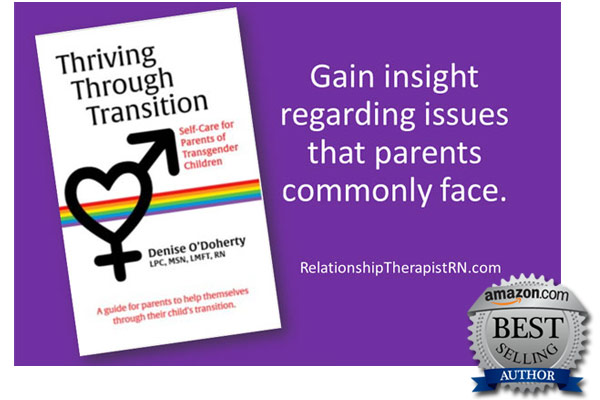Parents of Transgender Children Help
What happens when your amazing child who you have given unconditional love and support, challenges you with the situation that he or she may be transgender?
Many parents show loving concern when they notice their child is “different”. They have an attitude that’s open to learning and understanding gender dysphoria so their child will get the appropriate attention and loving support they deserve. They want to help their child manifest their true nature. They find resources to support their child, and do all they can to help them make a successful transition.
Yet, for other’s, this does not come as easy for Parents of Transgender Children.

The initial awareness that one’s child is “different”, can be very confusing and disconcerting. The thought that one’s child may have a gender different from the one they are accoustomed to, can be very confusing and saddening. They may not know what to do or where to turn. They may be overwhelmed dealing with their child’s issues as well and dealing with unfamiliar feelings of their own.
Most people have little or no information on this topic and the information they do have is frequently incorrect. Initially, some parents have questions such as the following:
- How can I know if my child is transgender?
- Did I cause this? Can I stop it?
- What makes a person transgender?
- What are typical behaviors of transgender children, preteens and early adolescence and late adolescence?
- Is being transgender a choice?
- What is the difference between gender expression, gender identity and sexual orientation?
- Is this a phase?
- If my child is really transgender, what should I do?
Family Issues that may arise for Parents of Transgender Children
- Conflict within the family. Not all spouses come to acceptance at the same time or same level. Siblings may not be accepting.
- Fear for the Safety and Well-being of Your Child
- Fear of Judgment or being Criticized by Family or Friends
- Fear of having to tell Family or Friends
- Cultural, Religious, Ethnic and Racial Influences
- Regret and Self-blame
- Handling Negative Reactions from others
Issues of Concern Should Your Child Be Transgender
- When should I let my child live as their preferred gender?
- How do I express love and support for my child’s gender expression?
- What if I don’t feel supportive?
- Disclosure: Who to tell, how, why and when?
- What do I Say?
- How to Prepare Your Child for Possible Adversity
- Addressing Gender in the Classroom
- Dealing with Medical Issues for Transgender Children
Parents of Transgender Children: How I Can Help
If you are struggling with any of the concerns as stated above, therapy can be a safe place to talk about your feelings, your child and your situation. I have worked with gender dysphoria for 25+ years. We can discuss your child’s history, and if your child meets the criteria of gender dysphoria. If your child is transgender, therapy can deepen your understanding and give you support in dealing with issues you and your child are facing. For you, there is often grief over lost dreams for your child.
Also, there is the grief that parents have for themselves loosing their dreams of what they thought the future would be like. The pain of this loss can result in disbelief, anger, rage, betrayal, confusion and profound sadness. For other parents, the identification of gender dysphoria makes sense of symptoms they have seen through the years, and therefore the change is less profound and acceptance comes easier. Therapy can provide guidance and validation if you are looking for support to help you help your child to have a safe and healthy transition.
No matter where you are on the continuum, therapy can give you support to deal with your personal feelings. It can alleviate feelings of isolation and replace them with insight and understanding. There are unique challenges that thousands of families face raising gender variant children or children who step outside the “boy” or “girl” box. Should your child be transgender, therapy can support, educate and empower you to handle the many issues that will arise.
Therapy can support you by providing a safe place to accept, acknowledge and process your feelings, to explore any grief you may have, to trust that you can cope and prosper throughout the process, to feel good about yourself as a loving parent, and continue to be the loving parent that can raise, support and foster a “gender-healthy” child.
A Guide For Parents Of Transgender Children
(And Everyone Who Loves a Transgender Child and the People Raising Them)
“Mom, Dad – I’m Transgender.”
As the parent – What do you say? What do you do? How do you cope with what is about to unfold in your life?
 A parent’s life can change forever when a child “comes out” and says they are transgender. Even if you had a suspicion that something was “different” about your child, the word “transgender” or “transition”, will likely cause a multitude of conflicting emotions and countless questions.
A parent’s life can change forever when a child “comes out” and says they are transgender. Even if you had a suspicion that something was “different” about your child, the word “transgender” or “transition”, will likely cause a multitude of conflicting emotions and countless questions.
This book was written to make the adjustment process easier for parents or anyone who loves a transgender person. Specifically, you will:
- Gain insight regarding Transgender Children and what the issues are that parents commonly face
Receive valuable suggestions on how to work through feelings such as grief, denial, depression, anger, shame and guilt with your Transgender Children. - Learn conflict management for siblings and other family members.
- Become well-versed in knowing what to say to others and how to effectively deal with resistance.
- Develop effective methods of addressing religious, cultural and social issues.
- Discover how to cope and take care of yourself in the process
- Understand acceptance and what it can mean for you as the parent.
This book is a must-read resource for family members, educators, clergy, counselors, the medical field, social awareness advocates and everyone who loves a transgender person and the parent raising Transgender Children.
Soft Cover: $12.95
Kindle Download: $6.99
Also Available in Spanish on Amazon!
About the Author – Denise O’Doherty
Denise O’Doherty LPC, MSN, LMFT, RN, a native New Yorker, is a psychotherapist, a Licensed Professional Counselor, Licensed Marriage and Family Therapist, a Certified IMAGO Relationship Therapist, and a Registered Nurse. She has had a full-time private practice in Houston, Texas for over 25 years. Schedule and appointment with Denise.
In addition to her practice, Denise is an educator, lecturer and author. She presents regularly to professional, corporate and civic organizations on personal development and transgender education. She has been a Clinical Instructor for the University of Texas at Houston School of Nursing. Her warm and engaging style provides enlightenment, clarity and insight. She inspires confidence while helping others seek positive change. Denise specializes in Gender Identity Issues, Marriage and Family Therapy, Relationship Counseling, Pre-Marital Counseling, Addiction, Recovery and Codependency.
She recently published a workbook, “Personal Boundaries and Effective Confrontation.”
Resources:
http://www.pflaghouston.org/
Contact me at 713-823-4001 or fill out the form below. I welcome your call so we can discuss your specific situation and the benefits therapy may provide for you.

